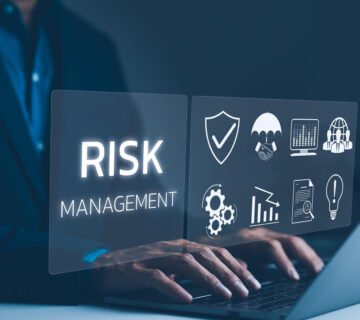Table of Contents
ToggleIntroduction: The Supply Chain Revolution in Saudi Arabia
In today’s rapidly evolving global market, digital transformation in supply chain operations has become a critical imperative for Saudi businesses. The Kingdom’s strategic position in global trade, combined with Vision 2030’s economic diversification goals, creates unprecedented opportunities for supply chain innovation. At Trax Group, we recognize that modern supply chain digital transformation is not just about technology adoption—it’s about fundamentally reimagining how goods, information, and value flow through your organization.
This comprehensive guide explores how Saudi businesses can leverage digital supply chain technologies to achieve greater efficiency, resilience, and competitive advantage in an increasingly complex global marketplace.
What is Supply Chain Digital Transformation and Why Does It Matter?
Understanding the Core Concept
Supply chain digital transformation represents a fundamental shift from traditional, linear supply chain models to connected, intelligent, and agile ecosystems. It involves integrating digital technologies across all supply chain functions to create unprecedented visibility, responsiveness, and efficiency.
The Saudi Business Context
For Saudi organizations, embracing digital transformation in supply chain operations delivers significant advantages:
- Enhanced Operational Efficiency through automated processes and real-time monitoring.
- Improved Cost Management by optimizing inventory and transportation.
- Increased Supply Chain Resilience against global disruptions and market volatility.
- Competitive Advantage in both domestic and international markets.
- Vision 2030 Alignment supporting economic diversification and technological advancement.
How Can Technology in Supply Chain Drive Real Business Value?
The Digital Toolkit for Modern Supply Chains
Modern technology in supply chain management encompasses several transformative solutions:
Internet of Things (IoT) Applications
The implementation of IoT in supply chain operations enables real-time tracking and monitoring through:
- Smart sensors for condition monitoring (temperature, humidity, shock).
- GPS tracking for shipment visibility and location intelligence.
- Predictive maintenance for transportation assets and equipment.
- Warehouse automation and inventory management systems.
Artificial Intelligence and Machine Learning
The integration of AI in supply chain management revolutionizes decision-making through:
- Demand forecasting and predictive analytics
- Intelligent route optimization and logistics planning
- Automated quality control and inspection processes
- Cognitive automation for administrative tasks and documentation
Cloud Computing Solutions
Leveraging cloud computing for supply chain operations provides:
- Scalable infrastructure for supply chain applications
- Real-time collaboration across partners and geographies
- Enhanced data security and compliance capabilities
- Reduced IT infrastructure costs and maintenance
What Role Does Data Analytics Play in Modern Supply Chains?
Transforming Data into Strategic Insights
The implementation of data analytics in supply chain operations represents a fundamental shift from reactive to proactive management. Advanced analytics capabilities enable:
Predictive Analytics
- Forecasting demand patterns with unprecedented accuracy.
- Predicting potential disruptions and developing mitigation strategies.
- Optimizing inventory levels based on historical data and market trends.
- Identifying supplier risks and performance issues before they impact operations.
Prescriptive Analytics
- Recommending optimal actions based on complex scenario analysis.
- Automating replenishment decisions and purchase orders.
- Optimizing transportation routes considering multiple variables.
- Identifying cost-saving opportunities across the supply network.
Real-time Analytics
- Monitoring supply chain performance through live dashboards.
- Tracking key performance indicators (KPIs) across all operations.
- Providing instant visibility into exception management.
- Enabling rapid response to changing market conditions.
How is IoT in Supply Chain Revolutionizing Saudi Operations?
Creating Connected, Intelligent Supply Networks
The implementation of IoT in supply chain operations is transforming Saudi businesses through several key applications:
Smart Warehouse Management
- Automated inventory tracking and management systems.
- Real-time monitoring of storage conditions and asset locations.
- Predictive maintenance for material handling equipment.
- Enhanced security through connected surveillance systems.
Intelligent Transportation
- Real-time fleet tracking and management solutions.
- Condition monitoring for sensitive goods during transit.
- Predictive maintenance for transportation assets.
- Route optimization based on live traffic and weather data.
Asset Management
- Tracking high-value assets throughout the supply chain.
- Monitoring equipment utilization and performance.
- Predictive maintenance scheduling for critical infrastructure.
- Automated replenishment of consumables and spare parts.
Why is AI in Supply Chain Management Becoming Essential?
The Intelligence Revolution in Supply Chain Operations
The integration of AI in supply chain management is no longer optional for competitive businesses. Key applications include:
Demand Forecasting and Planning
- Machine learning algorithms analyzing historical data and market trends.
- Predictive models accounting for seasonality, promotions, and external factors.
- Automated inventory optimization based on forecasted demand.
- Dynamic pricing strategies responding to market conditions.
Intelligent Logistics and Routing
- AI-powered route optimization considering multiple constraints.
- Dynamic load planning and carrier selection.
- Predictive ETAs accounting for weather, traffic, and other factors.
- Automated freight auditing and payment processing.
Supplier Relationship Management
- AI-driven supplier performance monitoring and evaluation.
- Predictive risk assessment for supplier relationships.
- Automated contract management and compliance monitoring.
- Intelligent sourcing recommendations based on multiple criteria.
How Can Cloud Computing for Supply Chain Enhance Flexibility?
The Platform for Supply Chain Innovation
Implementing cloud computing for supply chain operations provides Saudi businesses with unprecedented flexibility and scalability:
Infrastructure Advantages
- Scalable computing resources adapting to business needs.
- Reduced capital expenditure on IT infrastructure.
- Enhanced disaster recovery and business continuity capabilities.
- Global accessibility for distributed teams and partners.
Collaboration Enhancement
- Real-time information sharing across organizational boundaries.
- Integrated platforms connecting suppliers, manufacturers, and customers.
- Enhanced visibility through shared dashboards and reporting.
- Streamlined communication and decision-making processes.
Innovation Acceleration
- Rapid deployment of new supply chain applications.
- Access to emerging technologies through cloud platforms.
- Simplified integration with partner systems and platforms.
- Continuous updates and feature enhancements.
What Are the Key Steps in Optimizing Supply Chain with Digital Tools?
A Practical Implementation Framework
Optimizing supply chain with digital tools requires a structured approach:
Assessment and Strategy Development
- Comprehensive current state analysis of existing processes.
- Identification of key pain points and improvement opportunities.
- Development of a clear digital transformation roadmap.
- Establishment of business case and success metrics.
Technology Selection and Implementation
- Evaluation of suitable technologies based on specific needs.
- Phased implementation approach minimizing disruption.
- Integration with existing systems and processes.
- Change management and user adoption strategies.
Continuous Improvement and Optimization
- Ongoing performance monitoring and measurement.
- Regular review and adjustment of digital solutions.
- Incorporation of new technologies and capabilities.
- Scaling successful initiatives across the organization.
Case Studies: Digital Supply Chain Success in Saudi Arabia
Real-World Transformations
Manufacturing Sector
A leading Saudi manufacturer achieved remarkable results through digital transformation in supply chain:
- 40% reduction in inventory carrying costs.
- 30% improvement in on-time delivery performance.
- 25% reduction in transportation costs through optimized routing.
- Enhanced visibility across their extended supply network.
Retail Distribution
A major Saudi retailer transformed operations through supply chain digital transformation:
- Implementation of AI-powered demand forecasting.
- Real-time inventory visibility across all locations.
- Automated replenishment systems reducing stockouts.
- Enhanced customer satisfaction through improved availability.
Logistics Services
A Saudi logistics provider leveraged technology in supply chain to achieve:
- 99% shipment visibility through IoT implementation.
- 35% improvement in asset utilization.
- Automated documentation reducing processing time by 60%.
- Enhanced compliance and security through blockchain integration.
Overcoming Challenges in Digital Supply Chain Implementation
Navigating the Transformation Journey
Saudi businesses often face specific challenges in implementing digital transformation in supply chain:
Integration Complexity
- Legacy system compatibility and migration.
- Data silos and standardization issues.
- Partner and supplier connectivity challenges.
- Change management and organizational resistance.
Security and Compliance
- Data protection and cybersecurity concerns.
- Regulatory compliance across multiple jurisdictions.
- Intellectual property protection in collaborative environments.
- Privacy considerations in data sharing.
Skills and Capabilities
- Digital literacy and technical skills gaps.
- Change management and adoption resistance.
- Cultural transformation requirements.
- Continuous learning and development needs.
The Future of Digital Supply Chain in Saudi Arabia
Emerging Trends and Opportunities
Advanced Technologies
- Blockchain for enhanced transparency and security.
- Digital twins for simulation and optimization.
- Advanced robotics and automation in logistics.
- 5G connectivity enabling real-time operations.
Saudi-Specific Developments
- Vision 2030-driven supply chain initiatives.
- Growing focus on sustainable and green logistics.
- Expansion of regional distribution hubs.
- Enhanced cross-border trade facilitation.
How Trax Group Supports Your Supply Chain Transformation
Our Comprehensive Approach
At Trax Group, we provide end-to-end support for digital transformation in supply chain:
Strategic Consulting
- Supply chain assessment and digital maturity evaluation.
- Transformation roadmap development and business case creation.
- Technology selection and implementation planning.
- Change management and organizational alignment.
Implementation Services
- System integration and deployment.
- Data migration and cleansing.
- Process redesign and optimization.
- Training and capability development.
Ongoing Support
- Performance monitoring and optimization.
- Continuous improvement initiatives.
- Technology updates and enhancements.
- Strategic partnership and collaboration.
Conclusion: Transform Your Supply Chain for the Digital Age
Digital transformation in supply chain is no longer optional for Saudi businesses seeking competitive advantage. By embracing technologies like IoT, AI, and cloud computing, companies can achieve unprecedented efficiency, resilience, and customer satisfaction.
The journey requires strategic planning and expert guidance, but the rewards—including optimized costs, improved service levels, and future-ready operations—make it essential for growth.
Ready to transform your supply chain? Contact Trax Group today to begin your digital transformation journey.
F.A.Qs
Frequently asked questions
IoT enables real-time tracking, condition monitoring, predictive maintenance, and enhanced visibility across supply chain operations, helping Saudi businesses improve efficiency, reduce costs, and enhance customer service.
Trax Group provides seamless Microsoft Dynamics 365 implementations tailored for Saudi businesses. Our services include comprehensive readiness assessments, customized deployment strategies, and ongoing support to maximize return on investment and minimize disruption.
AI transforms supply chain operations through demand forecasting, intelligent routing, automated decision-making, and predictive analytics, enabling businesses to optimize operations and respond proactively to market changes.
Cloud computing provides scalable infrastructure, enhanced collaboration capabilities, and rapid deployment of new applications, enabling Saudi businesses to adapt quickly to changing market conditions and business needs.
The journey typically begins with a comprehensive assessment of current operations, identification of key improvement opportunities, development of a clear roadmap, and careful selection of appropriate technologies and partners.
Other Questions
General questions
Trax Group provides end-to-end support including strategic consulting, technology implementation, change management, and ongoing optimization, leveraging our deep expertise in both supply chain management and digital technologies.
Our methodology is built on a proven four-phase framework: Assess, Design, Implement, and Optimize. We begin by conducting a deep-dive assessment of your current supply chain, then design a tailored digital roadmap. Our experts manage the seamless implementation of technologies, followed by continuous optimization to ensure you achieve and exceed your business goals.
Yes, we specialize in developing tailored digital supply chain solutions for key sectors in Saudi Arabia, including manufacturing, retail, logistics, and oil & gas. Our solutions are customized to address the unique regulatory, operational, and market challenges of each industry.
We focus on tangible business outcomes from the start. By aligning technology investments with specific KPIs—such as reduced inventory costs, improved order accuracy, and faster delivery times—we build a clear business case and provide ongoing performance tracking to demonstrate and maximize your ROI.
Absolutely. A key part of our expertise is creating a connected ecosystem. We develop strategic integration plans that allow new technologies like AI and IoT platforms to work seamlessly with your existing ERP and warehouse management systems, protecting your previous investments while unlocking new capabilities.





No comment